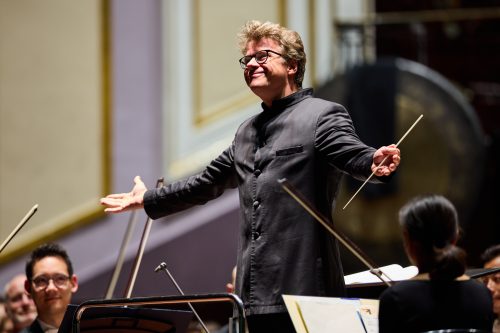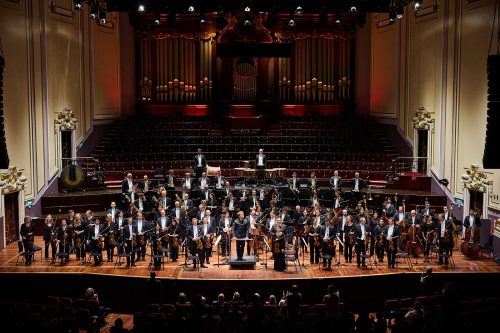
 United Kingdom Edinburgh Worldwide Pageant 2024 [6] – Dvořák, Suk: Kateřina Knĕžíkova (soprano), Adam Plachetka (bass-baritone), Edinburgh Pageant Refrain (director: James Grossmith), Bamberger Symphoniker /Jakub Hrůša (conductor). Usher Corridor, Edinburgh, 9.8.2024. (GT)
United Kingdom Edinburgh Worldwide Pageant 2024 [6] – Dvořák, Suk: Kateřina Knĕžíkova (soprano), Adam Plachetka (bass-baritone), Edinburgh Pageant Refrain (director: James Grossmith), Bamberger Symphoniker /Jakub Hrůša (conductor). Usher Corridor, Edinburgh, 9.8.2024. (GT)

Dvořák – Te Deum, Op.103 B 176
Josef Suk – Symphony No.2 in C minor, Op.27 ‘Asrael’ (1905/6)
This was one of the crucial memorable live shows that I’ve attended on the Edinburgh Worldwide Pageant for a few years, not solely due to the virtuosity and lovely artistry of the musicians of this excellent orchestra and their conductor however for the marvellous ‘Asrael’ Symphony by Josef Suk.
It’s hardly stunning that the three-concert residency by the Bamberger Symphoniker was dominated by music from the Czech Republic; earlier than World Struggle Two, the orchestra have been referred to as the German Philharmonic Orchestra in Prague, and with the intention to escape the Pink Military, the ensemble relocated to the regional city of Bamberg in Bavaria from which they’ve change into a famend worldwide orchestra. Most of the twentieth century’s best conductors have labored with the orchestra, and for this residency, their chief conductor since 2016, Jakub Hrůša introduced two of the least identified items of Bohemian and Moravian music. There’s a hyperlink within the two works as a result of Suk was married to Dvořák’s daughter Otilie (who died on the early age of 27), and who was additionally a composer and a pianist. Her passing adopted upon the demise of Dvořák, therefore the symphony is haunted by the theme of destiny.
Dvořák’s Te Deum was commissioned earlier than the composer’s domicile in America by Jeanette Thurber of the New York Conservatoire to commemorate the four-hundredth anniversary of Columbus’s touchdown. The orchestra’s opening passages yielded a beneficial impression of the musicality of the orchestra; the strings are golden-toned with magnificent brass and a virtuoso woodwind. Hrůša positioned his violins on both aspect, with the violas to his left and cellos to the suitable. The trombones and horns have been on both aspect of the woodwind group.
The entry of the timpani got here nearly like a shock firstly, considerably startling for a sacred piece within the opening Allegro moderato, the singing by the refrain was spectacular, but they appeared just a little drowned out by the proximity of the percussion. The secular nature of the work was evident additionally within the Lento maestoso. On the similar time, the ostinato hints at Indian folklore within the Vivace and within the celebratory ending motion Lento, once more displaying the work is extra secular than non secular; the composer had heard the Iroquois singers in Prague in 1879.
The Edinburgh Pageant Refrain have been magnificent of their peerless singing, and the soprano of Kateřina Knĕžíkova was a spotlight of the night along with her lovely dulcet tones; her interpretation was so clear we didn’t must learn the surtitles; one wish to hear extra from her. The subtly-voiced bass-baritone of Adam Plachetka was stirring, assisted by the magnificent accompaniment from Hrůša’s orchestra.

The total glory and virtuosity of the orchestra have been heard to the total within the second half with the hour-long ‘Asrael’ Symphony by Suk. This composer’s orchestral items within the live performance corridor akin to Pohádka (Spring) are spectacular for his or her vibrant orchestration and charming harmonies, but little else is heard by audiences right here. The symphony was championed by Václav Talich, but the complexity of the orchestration, and its size hinder it from being broadly carried out. Czech orchestras normally deliver us the symphonies of Dvořák and Smetana, but after listening to this, it’s clear the ‘Asrael’ Symphony is a masterpiece that deserves extra consideration.
The ‘Asrael’ Symphony is heard extra steadily within the recording studio, for there are a number of effective recordings obtainable; I like Talich’s ‘historic’ studying, and there’s a effective interpretation by Yevgeny Svetlanov if you’ll find it. Jakub Hrůša’s perception within the rating is revealed in that he has recorded it twice lately, and noticeably didn’t use a rating. The symphony embraces the theme of the Angel of Dying from Hebrew, and wherein are heard quotations from the Requiem and Rusalka, and from his beloved Otilie.
The opening motion, Andante sostenuto, was graced by an exquisite cor anglais solo by Zsófia Magyar, and the orchestra exhibited all its brilliance by the excellent swirlingly verdant strings; there have been pleasant solos from the flute of Daniela Koch, and particularly on the shut of the prolonged opening motion by the solo piccolo of Timea Acsai, and there may be an awesome nice theme of reflective ardour all through. Within the Andante, there have been some beautiful harmonies that reminded one fleetingly of the luxurious orchestration of Korngold and Schoenberg, but Suk’s individuality emerged triumphantly.
This was much more evident within the following Vivace, by means of the energetic enjoying creating of the wealthy strings and the effervescence of the wind – the spectacular imaginative and prescient of an evening sky crossed by meteors and glowing comets as if we have been hurtling by means of the cosmos. It was a shattering efficiency wherein each musician introduced out all of the vivacious pleasure of Suk’s rating, so nice was the impression {that a} storm of applause broke out earlier than the second half. The 2 final actions have been written after the passing of Dvořák and Suk’s spouse and assume a deeply tragic character, but slightly than undue emotion, reverence and human dignity prevail.
There are hints of (Richard) Straussian orchestration and of Dvořák, and Suk quotes an intriguing theme in an exquisite violin solo by the orchestra chief Bart Vandenbogaerde. The 2 harps invoke harmonies which are taken up by the plush strings like an awesome grieving heartbeat in the movingly poignant Adagio in reminiscence of his beloved Otilie. Within the Adagio maestoso, the depth was enhanced by the thrilling timpani strokes invoking the strategy of demise and heightened by the tragic beat from the bass drum. Quotations from Dvořák’s Requiem and Rusalka emerge in homage to his mentor, and slowly after reaching a fantastically orchestrated fruits, the music slowly descends into silence.
There generally comes a live performance which one finds troublesome to overlook for its distinctive musicality and efficiency, and this night was a kind of really memorable occasions. I recall, in previous festivals right here, equally momentous performances of Delius’s A Mass of Life and Scriabin’s Prometheus which astonished one for his or her outstanding originality and efficiency. This closing live performance of the Bamberger Symphoniker’s residency will stay with me for a few years, and hopefully Josef Suk’s ‘Asrael’ Symphony will collect better recognition on this nation. This was a outstanding efficiency wherein each measure of this virtuoso orchestra was heard; one hopes it will result in extra visits by this orchestra, and hopefully, they are going to deliver extra missed music to our audiences.
Gregor Tassie


